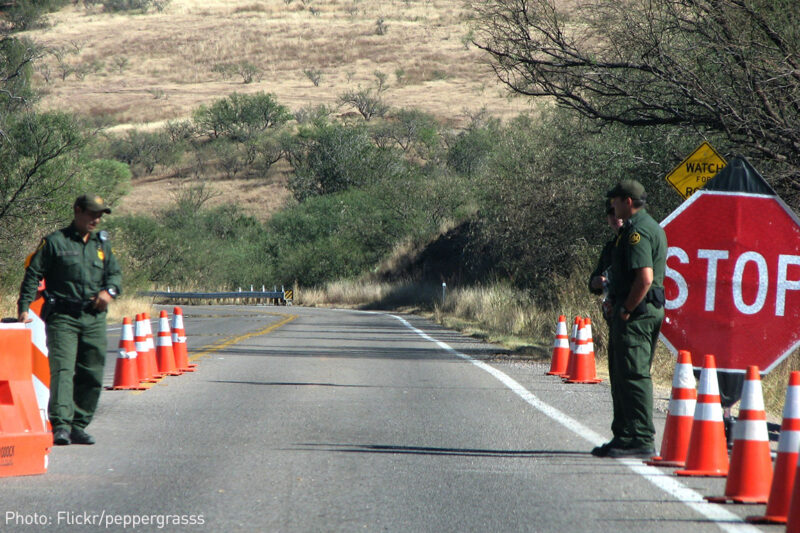
This piece was originally published in The Hill.
Where are you going? Why are you going there? When did you purchase your vehicle? Can I search your car? Do you have a body in the trunk?
These are some of the questions agents ask me when I cross through a Border Patrol checkpoint. Before I moved to Alamogordo, New Mexico, to teach, I had no idea such military-style checkpoints existed within the United States. To be clear, I’m not talking about something you encounter at the U.S.-Mexican border; these checkpoints are in an American town. Border Patrol operates checkpoints located upwards of 100 miles into the U.S. This “100-mile zone,” where roughly 200 million people in the U.S. live, sometimes feels like occupied territory.
I never faced anything like this in Minnesota, where I’m from. I cannot imagine that people living back home or in Washington, D.C., or Chicago — both located within the 100-mile zone — would stand for a federal agency blocking every route out of their city and forcing them to answer invasive questions from aggressive agents.
Border residents here on our southwest border, however, face routine interrogations at checkpoints as we go about our daily lives.
My recent experience at a checkpoint located between Las Cruces and Alamogordo, New Mexico, is emblematic of the disrespectful treatment we are forced to endure. After dutifully verifying my U.S. citizenship, the Border Patrol agent asked how I was related to the passenger in my car. When I refused to answer that question and any other unrelated to my citizenship, as I have every right to do, he bristled and pressed her for more details. When he was finally finished, he said snidely, “Have fun with your rights.” A reference, perhaps, to his infringement on our right, as U.S. citizens, to travel freely within our country.
This “100-mile zone,” where roughly 200 million people in the U.S. live, sometimes feels like occupied territory.
These stops are invasive and anxiety producing for me, a white person. But the stakes are far higher for Latinos. When I go through, it’s an inconvenience. When my Latina roommate commutes through a checkpoint, she’s put on trial. And she isn’t alone. The ACLU uncovered 6000 pages of complaints alleging abuses that include verbal abuse, threatening behavior, and racial profiling.
Racial profiling is wrong. If we truly value human dignity and fairness, then allowing a federal agency to stop and frisk people of color in border communities, predominantly Latino/a motorists, is not only unjust but also represents a waste of taxpayer dollars.
Currently, Border Patrol agents don’t have to report any of their stops or searches that don’t result in arrests. We frequently hear accounts from Latinos in border communities of officers singling them out and mistreating them for no apparent reason, but without transparent, publicly accessible data about these occurrences, we’ll never know exactly how widespread the problem is or the scope of the resources needed to eradicate it.
As long as these checkpoints exist, Customs and Border Protection Commissioner Kerlikowske should implement reforms that mirror President Obama’s recommendations to local police and sheriff departments in an effort to rebuild community trust and transparency: strictly prohibit racial profiling, require Border Patrol agents to file reports that include racial demographics on all stops and searches, and implement a system for publicly reporting the data. Only then will we have the information we need to hold Border Patrol accountable to the same reforms rightfully urged of police departments nationwide.
Stay informed
Sign up to be the first to hear about how to take action.
By completing this form, I agree to receive occasional emails per the terms of the ACLU's privacy statement.
By completing this form, I agree to receive occasional emails per the terms of the ACLU's privacy statement.

